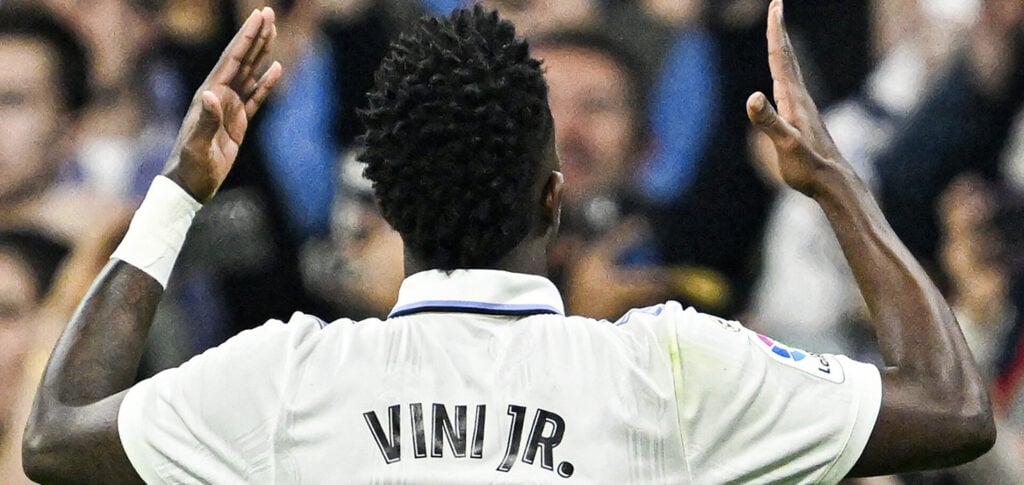O case of racism suffered by the player Vinicius Junior last Sunday (21) in a game of Real Madrid against Valencia was another one of ten cases of racism suffered by the Brazilian since the start of the Spanish championship. (UOL)
ADVERTISING
The previous cases did not result in severe punishments. Until this Tuesday (23), when seven suspects were arrested for racist attacks on the player. Four people are suspects linked to the doll that represented Vinicius hanged under a bridge in Madrid, in January 2023. The other three are suspected of making racist insults against the player during a match last Sunday.
“I'm sorry for the Spaniards who don't agree, but today, in Brazil, Spain is known as a country of racists. And, unfortunately, because of everything that happens every week, I can't defend it. But I am strong and I will go to the end against racists. Even if far from here.”
— Vinicius Junior in a social media post on Sunday.
On social media, people questionam: why is it only now that Spanish law is acting in cases of racism against Brazilians? What does the European country's law say about race crimes? O Curto News explains.
@curtonews How does Spanish law work in cases of racism? After the criminal offenses against Vini Jr., we looked at Spanish legislation to understand the legal punishments for discrimination.
♬ original sound – Curto News
What does Spanish law say about racism?
Since 2007, Spanish legislation has provided for punishments for those who commit crimes of racism and other types of discrimination at sporting events. The law makes it clear that anyone who commits these acts is subject to fines of up to €650 (R$3,5 million) and ban on attending stadiums for up to five years.
ADVERTISING
Clubs can be punished by stopping competitions or closing stadiums for up to two years. Furthermore, the Disciplinary Code of the Royal Spanish Football Federation provides that teams will be fined and may even lose points or be demoted if they do not take measures to combat violent and racist acts.
But that is not what has happened in LaLiga. Punishments for racism have not been very common in Europe.
The lawyer and specialist in Sports Law, Marcel Belfiore, explains that the repetition of racist insults directed at Vinicius Júnior led LaLiga to create a specific commission to deal solely with cases of racism against the Brazilian.
ADVERTISING
This shows, at least, that some importance has been given to these regrettable facts. “But has it been enough?” questionto the lawyer. “If the facts continue to repeat themselves, it is because that is not enough. And in my view, this is because punishments for individuals are rare and lenient,” he says.
Spanish legislation X Brazilian legislation
In Brazil, although it is not yet ideal, there is precedent for sports punishments more severe. In August 2014, for example, in the confrontation between Grêmio and Santos for the Copa do Brasil, goalkeeper Aranha, from the São Paulo team, was called a “monkey” by Grêmio fans.
The Gaucho club ended up being excluded from the competition, by decision of the Superior Court of Sports Justice, and had to pay a fine of R$50. The fans who were identified were banned from attending sporting events for two years. Furthermore, the match referee, Wilton Pereira Sampaio, was suspended for 90 days for not recording the Santos goalkeeper's complaints in the game summary.
ADVERTISING
On Monday (22), Real Madrid filed a complaint with the Spanish Attorney General's Office for crimes of hate and discrimination.
O Brazilian government also moves in statements of repudiation, he charges LaLiga and the International Football Federation (FIFA) and prometake action with Spain. President Luiz Inácio Lula da Silva even repudiated racist acts and expressed support for Vinicius Júnior in a speech at the G7 meeting in Japan.
At the beginning of May, Brazil and Spain signed an agreement aimed at combating racism e to xenophobia. Led by the Minister of Racial Equality, Anielle Franco, and the Minister of Equality of Spain, Irene Montero, the project foresees “the recognition of underreporting of acts of racial discrimination and hate crimes and the encouragement of reporting by victims, with assistance free legal aid”.
ADVERTISING
Read also
* The text of this article was partially generated by artificial intelligence tools, state-of-the-art language models that assist in the preparation, review, translation and summarization of texts. Text entries were created by the Curto News and responses from AI tools were used to improve the final content.
It is important to highlight that AI tools are just tools, and the final responsibility for the published content lies with the Curto News. By using these tools responsibly and ethically, our objective is to expand communication possibilities and democratize access to quality information. 🤖






